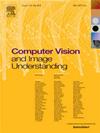用于轻量级图像超分辨率的高效特征重用蒸馏网络
IF 4.3
3区 计算机科学
Q2 COMPUTER SCIENCE, ARTIFICIAL INTELLIGENCE
引用次数: 0
摘要
近年来,使用深度卷积神经网络(CNN)的单图像超分辨率(SISR)研究取得了重大进展。虽然以前的方法擅长学习低分辨率(LR)和高分辨率(HR)图像之间的复杂映射,但它们往往需要大量的计算和内存资源。我们提出了高效特征重用蒸馏网络(EFRDN)来缓解这些挑战。EFRDN 主要由非对称卷积蒸馏模块(ACDM)组成,其中包含用于空间和信道特征提取的多重自校准卷积(MSCC)单元。它包括一个非对称卷积残差块(ACRB),用于增强方形卷积核的骨架信息,以及一个特征融合网格块(FFLB),用于将低阶输入信号转换为高阶表示。通过引入全局特征变换器模块,我们增强了特征重用和梯度流,从而提高了模型的性能和效率。广泛的实验结果表明,EFRDN 的性能优于现有方法,同时节约了计算和内存资源。本文章由计算机程序翻译,如有差异,请以英文原文为准。
An efficient feature reuse distillation network for lightweight image super-resolution
In recent research, single-image super-resolution (SISR) using deep Convolutional Neural Networks (CNN) has seen significant advancements. While previous methods excelled at learning complex mappings between low-resolution (LR) and high-resolution (HR) images, they often required substantial computational and memory resources. We propose the Efficient Feature Reuse Distillation Network (EFRDN) to alleviate these challenges. EFRDN primarily comprises Asymmetric Convolutional Distillation Modules (ACDM), incorporating the Multiple Self-Calibrating Convolution (MSCC) units for spatial and channel feature extraction. It includes an Asymmetric Convolution Residual Block (ACRB) to enhance the skeleton information of the square convolution kernel and a Feature Fusion Lattice Block (FFLB) to convert low-order input signals into higher-order representations. Introducing a Transformer module for global features, we enhance feature reuse and gradient flow, improving model performance and efficiency. Extensive experimental results demonstrate that EFRDN outperforms existing methods in performance while conserving computing and memory resources.
求助全文
通过发布文献求助,成功后即可免费获取论文全文。
去求助
来源期刊

Computer Vision and Image Understanding
工程技术-工程:电子与电气
CiteScore
7.80
自引率
4.40%
发文量
112
审稿时长
79 days
期刊介绍:
The central focus of this journal is the computer analysis of pictorial information. Computer Vision and Image Understanding publishes papers covering all aspects of image analysis from the low-level, iconic processes of early vision to the high-level, symbolic processes of recognition and interpretation. A wide range of topics in the image understanding area is covered, including papers offering insights that differ from predominant views.
Research Areas Include:
• Theory
• Early vision
• Data structures and representations
• Shape
• Range
• Motion
• Matching and recognition
• Architecture and languages
• Vision systems
 求助内容:
求助内容: 应助结果提醒方式:
应助结果提醒方式:


